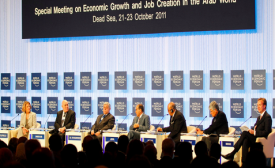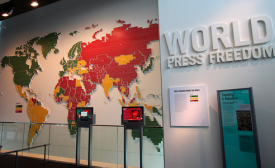public diplomacy

Successful public diplomacy is based on providing foreign publics what they need, be it information, a vaccination program, or help in securing economic well-being.
Among the principal assets of U.S. public diplomacy are American values. They are admired around the world, even by many people who dislike American policy. No other political system offers such extensive individual and systemic freedoms as those enumerated in the Bill of Rights. Showcasing and standing up for those freedoms should be at the heart of U.S. public diplomacy.

Among the principal assets of U.S. public diplomacy are American values. They are admired around the world, even by many people who dislike American policy. No other political system offers such extensive individual and systemic freedoms as those enumerated in the Bill of Rights. Showcasing and standing up for those freedoms should be at the heart of U.S. public diplomacy.
On April 12, 2013, the U.S. Embassy in Kyiv hosted a day-long conference for Ukrainian women entrepreneurs focusing on business owners of small and medium enterprises. The goal of the event was to promote the importance of Ukrainian women in fostering economic growth, build the confidence of women entrepreneurs to take on leading roles in business and society, provide practical tools for further empowerment, and serve as a platform for networking.
Among the principal assets of U.S. public diplomacy are American values. They are admired around the world, even by many people who dislike American policy. No other political system offers such extensive individual and systemic freedoms as those enumerated in the Bill of Rights. Showcasing and standing up for those freedoms should be at the heart of U.S. public diplomacy.
On my first morning as Under Secretary, I wanted to reach out to our many friends and partners who extend, amplify and inform our public diplomacy. You are valued stakeholders in the public diplomacy community and I would like to take this opportunity to introduce myself and share my vision for public diplomacy.
Many objected when Secretary of State John Kerry referred to Latin America as "the backyard" of the United States last April. While his statement may have been intended as an innocuous comment on geography, the implications of his words represent an all too common attitude about our Southerly neighbors that is not only ignorant, but often inaccurate.
Social media and public diplomacy are spinning a web for worldly Asian states. In this digital age of me, myselfie and I, we all know the power of social media to help us present our best face to the world. From Facebook to Instagram, YouTube to Twitter, we carefully cultivate everything about our lives; broadcasting ourselves, ‘bio-blogging’, ‘photo-shopping’ and massaging the mundane into the profound in a never-ending quest for likes, followers, +’s, pins, retweets and reposts.







